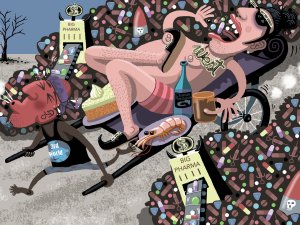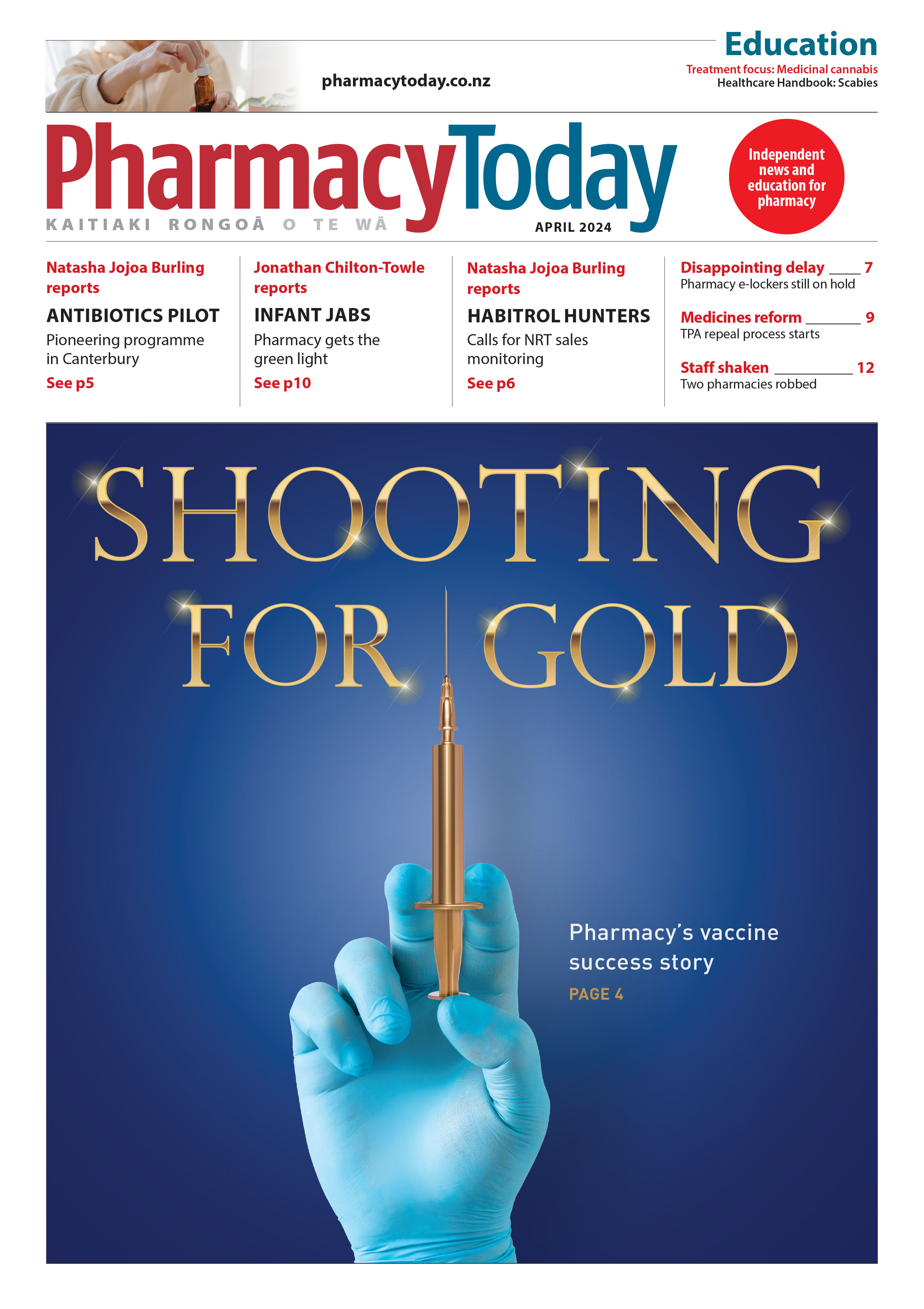In this article, Sue Frankland looks at the global problem of wastage of medications, including causes such as overprescribing and non-adherence. She also presents information from her master’s dissertation on how people understand, and respond to, medication expiration dates
Survey lifts the lid on diabetes stigma in New Zealand
Survey lifts the lid on diabetes stigma in New Zealand

“You shouldn’t be eating that.” “I don’t tell people I have diabetes.” “You’re not invited.” “You brought it on yourself.”
These are just some of the kinds of comments highlighting that stigma for those living with diabetes is alive and well in New Zealand. A quarter of a million New Zealanders have been diagnosed with diabetes.
Now, a groundbreaking survey uncovers the prejudice and stigma that many experience every day. Diabetes is the largest and fastest growing health issue in New Zealand, with one in every 19 Kiwis diagnosed with the condition and many more unaware that they have it.
This new research undertaken by Diabetes New Zealand reveals that most Kiwis with diabetes encounter negative attitudes that add to the stress of their condition.
“A shocking number of respondents reported that they have been blamed, judged or treated differently because they have type 1 or type 2 diabetes,” says Diabetes New Zealand CEO, Heather Verry. This is the first time that stigma has been studied in New Zealand.
The findings of the Diabetes NZ Stigma Survey of 824 members reveal remarkable similarity with Australian findings published previously by The Australian Centre for Behavioural Research in Diabetes (ACBRD).
Challenging the stigma surrounding diabetes is a main aim of Diabetes Action Month, which launches today. This year, Diabetes NZ will raise awareness of diabetes through nationwide action and educational activities around the theme Act Now to Live Well.
The campaign aims to provide support and advocacy for all people with diabetes and those around them.
“Dealing with ignorance and prejudice places a further burden on people who already face the difficult challenge of managing the physical aspects of their condition every day as well as its emotional burden,” Heather Verry says.
The Diabetes NZ Stigma Survey findings bring into the spotlight the power of language when it comes to diabetes and the need for awareness, education and support.
“What people with diabetes experienced most was blame and judgement from others. This is an area where we can all help by being more aware of the realities of living with diabetes, and 2 being more respectful in what we say to, and about, people with diabetes. Thinking about the words we use will help those with the condition feel more accepted and supported.”
“Given this stigma exists, it’s no wonder many people with diabetes don’t tell others they have the condition. But this can lead to isolation, loneliness, and potentially not getting the help they need in a medical emergency.”
One area of judgement that everyone with diabetes can relate to is comments on what they eat, with an astounding 68% of people with type 1 diabetes and 40% of those with type 2 being judged for their food choices. Some have even been left out of social events involving food or drink that other people think they shouldn’t have.
“Managing diabetes is not about avoiding certain foods. The decision of what to eat always lies with the individual, and it’s the job of those around them to provide support, without making decisions for them,” Mrs Verry says.
A particularly worrying finding is that diabetes stigma manifests in the workplace. One in 10 (10%) say they have been discriminated against at work because of their diabetes.
“Discrimination is an extreme form of stigma. Even if only 10% are affected, this is an alarming statistic when, barring a medical crisis, there is nothing about diabetes that affects a person’s ability to work,” says Mrs Verry.
“Given that there are so many Kiwis with the condition, it stands to reason that many thousands of them make positive contributions in the workforce every day. That’s more likely if others support them with understanding and empathy.”
Clear stigma around type 2 diabetes
“It is clear from the research that there is a massive negative stigma around the most common form of diabetes, type 2,” says Mrs Verry.
One in two respondents with type 2 diabetes said that people assume they are overweight or must have been so in the past. Mrs Verry says that, while weight is one of the risk factors for type 2 diabetes, it is not the only risk factor.
“Not everyone who is overweight develops diabetes and not everyone with the condition is overweight.”
Actually, type 2 diabetes has a strong genetic component. In New Zealand, people of Māori, Pacific or South Asian ancestry have a significantly higher genetic predisposition to developing type 2 diabetes compared to their fellow Kiwis.
People over the age of 40 are also at increased risk of developing the condition. For women, the risk of developing type 2 diabetes becomes significantly higher if they have had gestational diabetes during pregnancy.
“It is a gross oversimplification to ascribe type 2 diabetes to lifestyle alone. As people become better informed about diabetes, it will not only help combat the condition itself, but also the stigma surrounding it,” says Mrs Verry.
The Diabetes NZ Stigma Survey highlighted that respondents with type 2 diabetes aged under 65 are more likely to experience negative attitudes. This could be due to the fact that there is a greater expectation that older people might have some health problems. Nobody is harder on people with type 2 diabetes than they themselves, with the condition taking a heavy emotional toll.
Half of those aged under 65 with type 2 diabetes blame themselves for having the condition, and nearly as many say they feel guilty for having it or are embarrassed because of their diabetes.
One in three went as far as saying that having diabetes makes them feel “ashamed” or “a failure”.
Professor Jane Speight, Director of the ACBRD, whose Australian research inspired the Diabetes NZ Stigma Survey, says that self-blame is rarely constructive.
“While we know a lot about the risk factors for type 2 diabetes, no-one knows exactly what has caused a particular individual to develop the condition. People need to focus on what they can do now to live well with this challenging condition, not beat themselves up over what they may or may not have done in the past”, she said.
Added challenge for those with type 1 diabetes
Type 1 diabetes is caused by an auto-immune reaction where the body’s defence system attacks the cells that produce insulin, for reasons medical science does not fully understand yet. It is a life-long condition that can affect people of any age but usually develops in children or young adults.
Those with the condition need several injections of insulin every day in order to manage the levels of glucose in their blood. This research found that people with type 1 diabetes encounter negative responses when they inject in public. Nearly half say they are “embarrassed” (48%) or “self-conscious” (45%) by needing to manage their diabetes in public – and more than one in three (38%) say they worry that people think they’re taking illicit drugs when they’re injecting insulin!
“Apart from the emotional stress this causes, it can have very real health impacts if people feel inhibited or discouraged to properly manage their condition,” says Diabetes NZ’s Heather Verry.
Respondents were dismayed at how often others made them feel diabetes was their fault. For example, 60% of people with type 1 diabetes say others blame them and think it is a result of eating too much sugar.
“There is a common myth that sugar intake causes type 1 diabetes, but this is simply not the case,” says Mrs Verry.
In light of this, it is hardly surprising that 39% of people surveyed say they avoid telling people they have diabetes, to avoid such negative reactions.
Two in three respondents (66%) with type 1 diabetes also find that people make unfair assumptions about what they can or cannot do because of their diabetes.
“If they manage the condition, there is no reason people with type 1 diabetes cannot perform as well as anyone else and achieve their goals in life,” says Mrs Verry.
“The number of sports stars, performers and leading figures in business, politics and other fields bears ample testimony of this.”
Diabetes NZ recommendations Diabetes New Zealand exists to support people with diabetes, and Diabetes Action Month is about awareness, education, and action all New Zealanders can take to make a difference.
There are four simple things everyone can do:
1. Instead of judging and blaming people with diabetes, we all need to show a bit more empathy, and take time to learn about the condition, which can affect anyone.
2. Know your risk. Everyone is at risk of diabetes, and knowing your risk is the first step to taking action to reduce or delay your risk of diabetes. Diabetes NZ website has a simple test people can do to assess their risk of developing diabetes. (www.diabetes.org.nz/are-you-at-risk-1/)
3. Know the symptoms of diabetes. The sooner diabetes is diagnosed, the better the outcome can be. If you notice symptoms in yourself, see a healthcare professional; and encourage your whanāu to do the same. Learn more about diabetes on the Diabetes NZ website www.diabetes.org.nz
4. Find your support. Talk to your whānau and friends about diabetes, and join the conversation on the Diabetes NZ Facebook page.
Diabetes NZ works alongside champion sponsors Equal, Fitbit and Anytime Fitness to support those with diabetes and to raise awareness in Diabetes Action Month for 2018.





